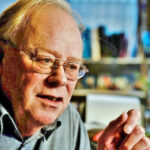Hay festival: ‘Climate change is a long struggle’
Global warming has always energised Hay audiences – but this year the mood is much more sober
John Harris
guardian.co.uk, Monday 31 May 2010 19.59 BST
For the past four or five years, one theme burned through discussions at Hay more than most: climate change, and the large and small things human beings might do to tackle it. Politicians – including, most famously, Al Gore – arrived here to talk up their ecological credentials, green authors warned the crowds of the doom that may await us, and everyone lapped it up.
Moreover, with the Copenhagen summit coming into view, last year’s environmental sessions had an infectious mixture of trepidation and momentum, as they focused on The Big Question: whether the governments of the world would congregate and resolve to actually do something.
And then look what happened. Copenhagen turned out to be a grim, acrimonious affair, and the United Nations Framework Convention on Climate Change process now looks dangerously close to stalling. Just before the summit took place, the so-called “Climategate” affair (when emails at the University Of East Anglia’s Climatic Research Unit were hacked, leading to a flurry of accusations about data manipulation) allowed the sceptics a field day. Immediately afterwards, a dispute about the Intergovernmental Panel on Climate Change’s work on melting Himalayan glaciers gave them even more encouragement. Recession and the crisis in public finances, too, seemed to hoof climate change well down the world’s list of political priorities – while even this year’s bitter winter gave the voices of climate-change denial yet another boost.
As a result, this year’s green Hay sessions have an ever-so-slightly tortured kind of atmosphere, translatable as “What are we going to do now?”, and are largely devoid of the spurts of tentative optimism that preceded Copenhagen.
[…]
To boil down any of Lovelock’s thoughts to a few sentences is to do him a serious disservice, but here goes. As he sees it, climate change is now all but out of control. We should certainly cut our greenhouse-gas emissions, but focus most of our efforts on adapting to a world that, sooner or later, will turn troublesome beyond words. As part of that, he has long claimed the only sustainable method of generating the electricity Britain needs is nuclear power – and that in large swathes of the world, solar and wind power are already proving to be a dangerous distraction. From time to time, he dispenses optimism, of a sort: he’s not having the standard-issue predictions of steadily-rising global temperatures, and thinks that though the Earth could suddenly heat up in a way that few models have so far predicted, we might also have longer to prepare than some people think.
“Who knows? Everybody might be wrong,” he says. “I may be wrong. Climate change may not happen as fast as we thought, and we may have 1,000 years to sort it out.”
[…]
Lees hele artikel -> guardian.co.uk






Geef een reactie